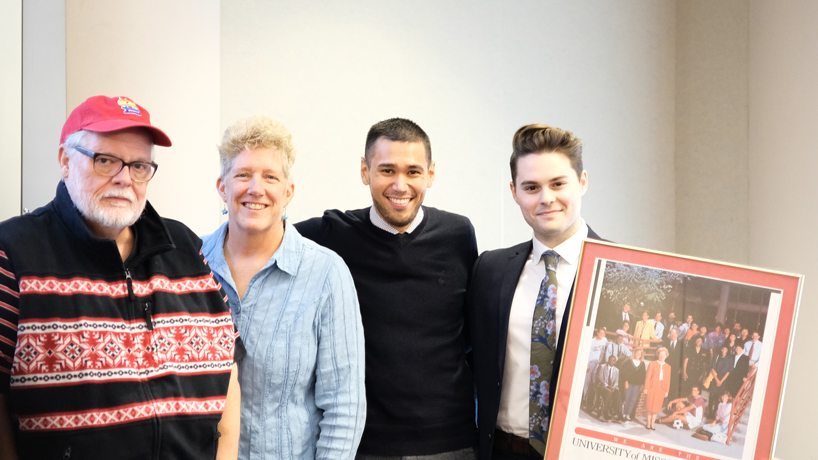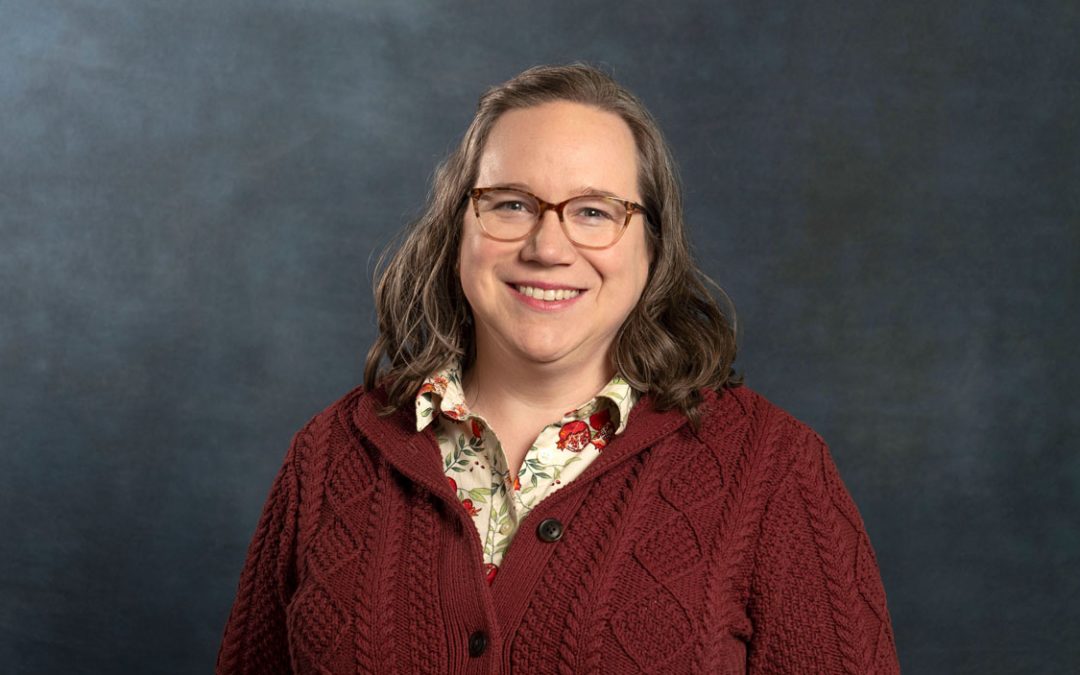
Panel members (from left) Mark Pope, Susan Kashubeck-West, Harry Hawkins and Cassidy Flynn pose with a University of Missouri–St. Louis poster, which had the words “sexual orientation” covered with Wite-Out. (Photo by Burk Krohe)
An important poster hangs in Woods Hall, but few people give it a second glance as they walk past.
It looks like an ordinary University of Missouri–St. Louis promotional poster from a previous era. A group of students is gathered, wearing the chunky sweatshirts and high-waisted jeans fashionable at the time. But look closer and a small detail reveals a much larger story.
Two words of the text at the bottom of the poster are censored with Wite-Out. Those words: sexual orientation.
The poster was the centerpiece of a discussion titled, “Queer and Now: Erasure and Reclamation” held at the Millennium Student Center on Tuesday. The event, which was sponsored by LGBTQ+ Initiatives and the PRIZM Queer – Trans – Straight Alliance, wrapped up programming for LGBTQ+ History Month.
The panel featured Cassidy Flynn, associate director of development, leadership giving; Harry Hawkins, LGBTQ+ coordinator; Mark Pope, retired Curators’ Distinguished Professor Emeritus of counseling and former chair of the Department of Counseling and Family Therapy; and Susan Kashubeck-West, professor and associate chair in the Department of Education Sciences and Professional Programs.
Flynn used the poster as a jumping off point for a discussion on the historical push to get LGBTQ+ faculty, staff and students recognized as a protected class by the University of Missouri System. According to a discussion Flynn had with Chancellor Emeritus Blanche M. Touhill, sustained efforts began around 1986.
Around 1989, the first student LGBTQ+ student group was formed at UMSL. The poster was produced around this time, as well. However, it wasn’t until the mid 2000s that LGBTQ+ faculty, staff and students were finally recognized as a protected group via a UM System resolution.
“This was a big deal because people had been working for this for 16 years trying to get a non-discrimination policy passed, so that people like me couldn’t be fired because somebody didn’t approve of my lifestyle,” Kashubeck-West said.
She noted that until then, LGBTQ+ faculty and staff often lived in fear of being fired – to the point that many people completely hid their relationships at work.
“This sounds like something that that might have been happening in the ’50s or the ’60s, but I got here in ’01, so this was probably around ’05, somewhere in there, that this happened,” Kashubeck-West said. “It was a big deal.”
Before the discussion shifted to a Q&A session with the audience, the panel addressed the work that still needs to be done on LGBTQ+ issues. Hawkins specifically highlighted issues related to transgender and non-binary people.
“Being the LGBTQ+ coordinator, I work with transgender and non-binary students,” Hawkins said. “I think when we look at our policies, we are, for the most part, good.”
However, he said a lot of education still needs to be done on day-to-day interactions with transgender and non-binary students.
“Increasing the number of gender-neutral bathrooms on our campuses is an initiative that I think we need to really be looking at,” he said.
But in general, UMSL faculty have been very receptive to being educated. Hawkins’ Safe Zone training sessions, which cover LGBTQ+ issues, regularly fill up even though they are not mandatory.
“We have people that genuinely want to learn about this community,” Hawkins said. “I’m currently looking at ways of expanding Safe Zone a little further and maybe having our regular Safe Zone training, then if you’ve taken that one, when you come back for another one, that’s just trans specific issues.”
Overall, Hawkins was pleased with the campus participation in the LGBTQ+ History Month, including the final panel.
“Our committee has done a fantastic job,” Hawkins said. “I could not have done it without them. The events have been very well attended. We’ve touched on so many different topics that the LGBT community have to deal with on a daily basis.”














